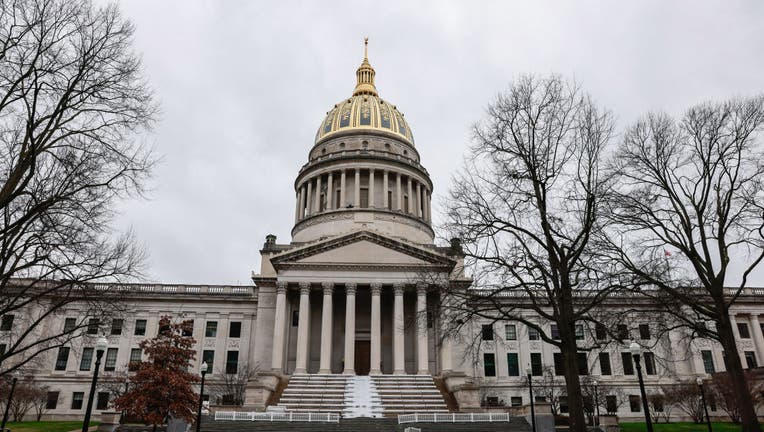West Virginia could ban transgender care

Preparations for the inauguration of West Virginia governor Jim Justice at the West Va., statehouse. (Photo by Jeremy Hogan/SOPA Images/LightRocket via Getty Images)
CHARLESTON, W.Va. (AP) - A bill that would ban evidence-based health care for transgender minors in West Virginia, the state estimated to have more transgender youth per capita than any other in the nation, is headed to the desk of Gov. Jim Justice.
The Republican governor has not taken a public stance on the measure and it's unclear whether he will sign it into law. A spokesperson said he was unavailable for comment Saturday.
A 2017 study by UCLA Law’s The Williams Institute estimated West Virginia had the highest per capita rate of transgender youth in the country.
Every major medical organization, including the American Medical Association, the American Academy of Pediatrics and the American Psychiatric Association, supports gender-affirming care for youths.
RELATED: Lawsuit: Transgender Wells Fargo teller says managers ‘laughed’ as customers mocked her
But lawmakers in West Virginia and other states advancing bans on transgender health care for youth and young adults often characterize gender-affirming treatments as medically unproven, potentially dangerous in the long term and a symptom of "woke" culture.
The bill in West Virginia would outlaw those under 18 from being prescribed hormone therapy and fully reversible medication for suspending the physical changes of puberty, allowing patients and parents time to make future decisions about hormone therapy.
The legislation also includes a ban on gender-affirming surgery for minors, something medical professionals emphasize does not happen in West Virginia anyway.
The bill contains significant exemptions to the medication therapy ban for people under the age of 18 at risk for suicide, provisions added in the final week of the 60-day legislative session, which ended Saturday.
The changes, made at the urging of Senate Majority Leader Tom Takubo, who is a physician, would allow some transgender youth to continue receiving medical interventions under certain circumstances, including hormone therapy if they experience severe gender dysphoria.
Gender dysphoria is defined by medical professionals as severe psychological distress experienced by those whose gender identity differs from their sex assigned at birth.
RELATED: Mormon church shows support for same-sex marriage law, believes act is still unbiblical
During a speech on the Senate floor late Friday night, Takubo referenced 17 peer-reviewed studies showing a significant decrease in the rates of suicide ideation and suicide attempts among youth with severe gender dysphoria who have access to medication therapy.
"These kids struggle, they have incredible difficulties," he said.
The rate of suicide ideation, or having suicidal thoughts or ideas, for transgender youth in Virginia is three times higher than the rate for all youth in the state, according to research complied by West Virginia University Medicine physicians using West Virginia Youth Risk Behavior Survey data.
The version of the bill first passed by West Virginia’s Republican supermajority House of Delegates last month contained no exemptions for mental health.
The House on Saturday unanimously approved the Senate's changes. The amended bill then passed 88-10, with all ‘no’ votes coming from the body's shrinking delegation of Democrats.
Democratic Del. Ric Griffith, who was the only legislator who spoke on the floor about the measure, voiced support for the mental health exemptions and was later one of only two lawmakers in the minority party to vote for the amended bill.
"We talk a lot about, ‘Parents know what’s best for their children,'" the Wayne County lawmaker said. "This is a fairly narrow allowance when a child could potentially be suicidal."
Under the amended bill, a person below the age of 18 would need to be diagnosed with severe gender dysphoria by at least two medical or mental health providers to gain access to medication therapy, including a mental health provider or adolescent medicine specialist.
The dosage must be the lowest possible necessary to "treat the psychiatric condition and not for purposes of gender alteration," according to the bill.
Providers must be specifically trained to diagnose and treat severe gender dysphoria in adolescents and provide written testimony saying medical interventions are necessary to prevent or limit possible or actual self-harm. The minor’s parents or guardians would be required to give written consent to the treatments.
Hormonal therapy could not be provided to minors before the age of puberty, something West Virginia physicians say doesn’t happen anyway.
The bill includes exceptions originating in the House version for individuals born with a "medically verifiable disorder," including people with ambiguous "external biological sex characteristics" and for people taking treatments for infection, injury, disease or disorder that has been "caused by or exacerbated by the performance of gender transition procedures."
People also can access treatment if they are in "imminent danger of death, or impairment of a major bodily function unless surgery is performed."
The vote to send the bill to the governor came two days after a crowd of protesters descended on the state Capitol, where cries of "trans kids matter" could be heard from the Senate chamber as lawmakers debated bills.
Democratic Del. Danielle Walker, the Legislature's only openly LGBTQ member, led chants of the state motto: "Mountaineers are always free."

